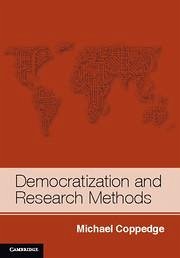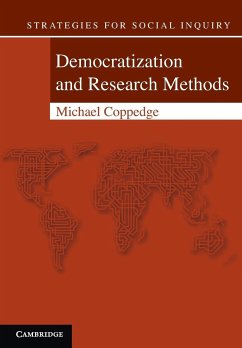Michael Coppedge
Gebundenes Buch
Democratization and Research Methods
Versandkostenfrei!
Versandfertig in über 4 Wochen
Weitere Ausgaben:

PAYBACK Punkte
40 °P sammeln!





Democratization and Research Methods summarizes what researchers know about why countries become and remain democracies, and why they often do not.
Michael Coppedge is Professor of Political Science at the University of Notre Dame. He is one of the principal investigators for the Varieties of Democracy Project at the Kellogg Institute, a collaboration producing many new indicators of democracy. He chaired the American Political Science Association's Task Force on Indicators of Democracy and Governance. His first book, Strong Parties and Lame Ducks: Presidential Partyarchy and Factionalism in Venezuela, analyzes institutional problems underlying the crisis of Venezuelan democracy. He has published articles on comparative and Latin American politics in the Journal of Politics, Perspectives on Politics, Comparative Politics, Comparative Political Studies, the Journal of Democracy, Party Politics, Studies in Comparative International Development and other journals and books. He is a past recipient of grants from Fulbright-Hayes, the Tinker Foundation, the World Society Foundation and the Research Council of Norway, and he has taught at Johns Hopkins School of Advanced International Studies, Princeton University, Yale University, and Georgetown University. Coppedge received his PhD from Yale University in 1988.
Produktdetails
- Verlag: Cambridge University Press
- Seitenzahl: 376
- Erscheinungstermin: 25. Juni 2012
- Englisch
- Abmessung: 249mm x 180mm x 25mm
- Gewicht: 794g
- ISBN-13: 9780521830324
- ISBN-10: 052183032X
- Artikelnr.: 35276622
Herstellerkennzeichnung
Libri GmbH
Europaallee 1
36244 Bad Hersfeld
gpsr@libri.de
"Democratization and Research Methods is a singularly comprehensive and impressive examination of the democratization literature through the lens of various methodological approaches. With extraordinary breadth and depth of understanding, author Michael Coppedge sheds light on both the democratization and social science methods literatures." - Wendy Hunter, University of Texas Austin
Für dieses Produkt wurde noch keine Bewertung abgegeben. Wir würden uns sehr freuen, wenn du die erste Bewertung schreibst!
Eine Bewertung schreiben
Eine Bewertung schreiben
Andere Kunden interessierten sich für













